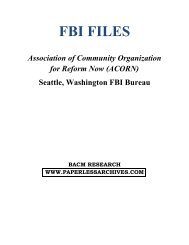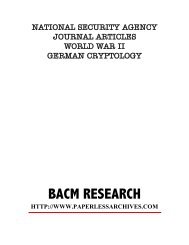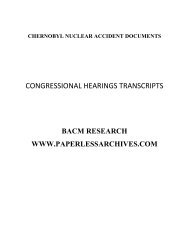Chernobyl Nuclear Power Plant CIA Files - Paperless Archives
Chernobyl Nuclear Power Plant CIA Files - Paperless Archives
Chernobyl Nuclear Power Plant CIA Files - Paperless Archives
You also want an ePaper? Increase the reach of your titles
YUMPU automatically turns print PDFs into web optimized ePapers that Google loves.
." .'<br />
·.<br />
soarc,. ...<br />
c<br />
)Gorbachev said the precise means that can<br />
protect the party from errors in politics are openness,<br />
criticism, and self-criticism. "The price of these errors<br />
is known to all of us," he added, which no doubt in<br />
large part, applied to the <strong>Chernobyl</strong>' information<br />
coverup.<br />
Since April 1986, on several occasions the Soviet<br />
media have promptly reported on accidents causing<br />
loss of life and publicized punitive measures taken<br />
against the officials responsible. Soviet media treatment<br />
of the sinking of the Admiral Nakhimov passena:er<br />
liner in August 1986 because of a:ross negligencc--apparently<br />
drunkenncss-and the firing of<br />
the responsible minister and prosecution of its captain<br />
and his deputy is a strikina: example. Other disasters,<br />
such as a collision of two passenger trains that Jdlled<br />
40 persons because one of the engine drivers was<br />
asleep, the spectacular methane coal mine explosion<br />
in the Ukraine late last year, and the more recent one<br />
in Chaykino mine in Donetsk have been reported<br />
immediately.<br />
A year after the accident, however, there are signs<br />
that the Soviets are again beina: less direct about<br />
<strong>Chernobyl</strong>' and that the openness in the months<br />
Collowing the accident may have found its limits.<br />
Despite signs oC popular concern, the regime has not<br />
taken steps to give the public more of a say on these<br />
issues. The major bureaucracies are resisting public<br />
pressure, and there are some signs of backtracking on<br />
glasnost:<br />
• Two Soviet journalists complained this April in the<br />
Soviet weekly Moscow News that information on<br />
Chcmobyl' is being withheld and is increasingly<br />
difficult to obtain, noting that information reported<br />
to the International Atomic Energy Agency is not<br />
beina: given to the public.<br />
• The official Soviet report presented to the IAEA at<br />
the August, 1986 meeting in Vienna, and made<br />
widely available to the West, was never released to<br />
the Soviet pUblic. A 20-page summary was eventually<br />
published in the November issue of Atomnaya<br />
Energ{ya, and Elektrlcheskiye stantsfi, both highly<br />
technical journals with a limited distribution.<br />
• Despite pledges of cOOperation at the outset, the<br />
Soviets have been reluctant to share the research on<br />
radiation data they have collected since the accident,<br />
according to the US Department of Energy<br />
and the <strong>Nuclear</strong> Regulatory Commission. In addition<br />
to the traditional reluctance of the Soviet Union<br />
to disclose information, the Soviets may fear new<br />
data will disagree with the information they have<br />
already made public or will prove embarrassing if<br />
future casualties appear among those being monitored,<br />
since they have claimed the health effect will<br />
be insignificant.<br />
The Moscow News article suggests the traditional<br />
argument that public opinion has no role-in the<br />
scientific and technical sphere is still being used to<br />
justify the restrictions. Ml'.f in the'affected bureaucracies,<br />
and even some senior Ic:..Jers, have a vestedinterest<br />
in ensuring the consequences of Chcmobyl'<br />
disappear from public view. They wouid like to avoid<br />
a real debate on the direction of the Soviet nuclear<br />
energy policy and on the location and safetypf<br />
existing and Cuture nuclear plants. Such a debate is<br />
troublesome to a regime Cormally committed to<br />
nuclear energy 'and the economic benefits of building<br />
nuclear plants ncar highly populated areas. Moreover,<br />
continued publicity will leave the regime open to<br />
criticism if it is unwilling to allocate Curther resources<br />
to deal withlong-tcrm envir.onmental and heal~h<br />
consequences.<br />
The news blackout during the three-week trial of<br />
plant officials in July was further indication that<br />
authorities are tightly controlling information on<br />
<strong>Chernobyl</strong>'. Shortly before the trial, Soviet Foreign<br />
Ministry officials described it as open and indicated<br />
Western reporters could attend. On the second day of<br />
the proceedings, however, foreign reporters were<br />
barred from the courtroom, and the trial continued<br />
behind closed doors. The decision to conduct the trial<br />
in secret, possibly in an effort to avoi
















